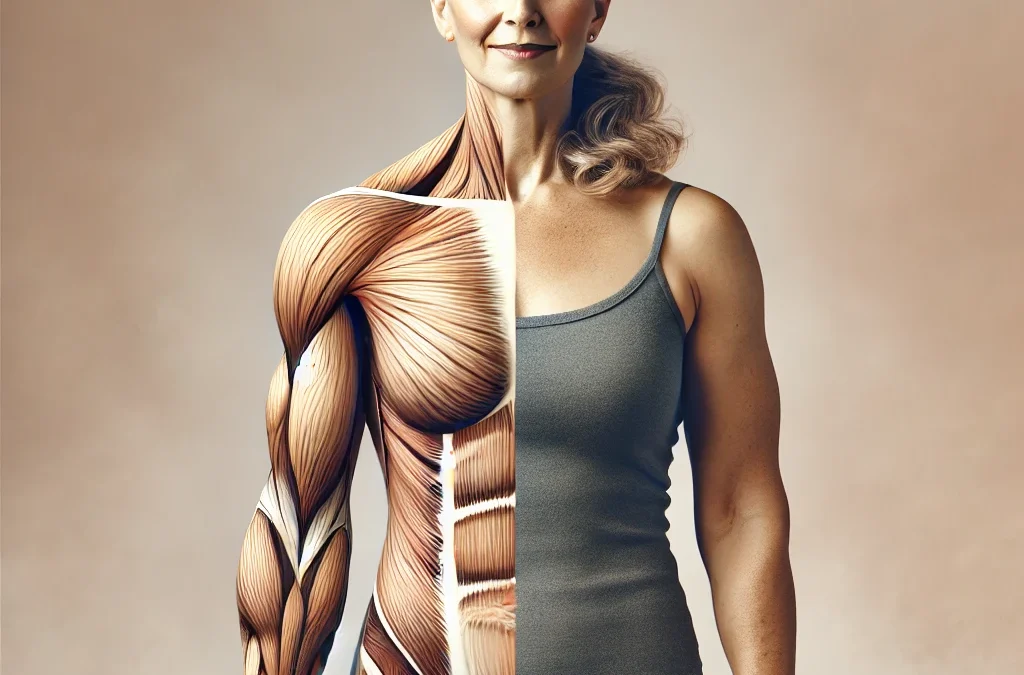Menopause is a significant transitional phase in a woman’s life, marked by a cessation of menstrual cycles and a drastic reduction in estrogen production. This hormonal shift can profoundly affect various aspects of health, including muscle health. Estrogen plays a vital role in maintaining muscle mass and strength, and its decline can lead to muscle atrophy (loss of muscle mass), increased fat deposition, and a reduction in physical strength.
Impact of Estrogen Loss on Muscle Health
Muscle Atrophy[i]: One of the key issues during post-menopause is sarcopenia, which refers to the loss of muscle mass and function. Estrogen has been shown to stimulate muscle protein synthesis and inhibit protein degradation, which is essential for maintaining healthy muscle tissue. A study found that postmenopausal women experienced a significant reduction in muscle mass and strength compared to premenopausal women.[ii]
Reduced Muscle Regeneration[iii]: Estrogen also plays a role in muscle regeneration and recovery. Following injury or intense physical activity, the muscle repair process is less efficient in postmenopausal women due to the decreased estrogen levels, which affects satellite cells responsible for muscle regeneration.
Increased Fat Infiltration[iv]: In addition to muscle loss, postmenopausal women tend to experience an increase in fat infiltration within the muscle tissues, which further exacerbates the loss of muscle strength and function. Research has shown that lower estrogen levels contribute to increased body fat and metabolic changes that promote fat accumulation in muscles.
Bone-Mass Loss and Muscle Function[v]: Muscle and bone health are closely related, and estrogen’s protective effect on bones also influences muscle health. Reduced bone density in postmenopausal women can impair muscle function and balance, increasing the risk of falls and fractures.
Supplemental Support for Muscle Health
Protein
Protein is a critical macronutrient for muscle repair and growth, especially following physical exertion. High-quality proteins are rich in essential amino acids that help rebuild muscle fibers post-workout. Research has demonstrated that protein supplementation significantly enhances muscle protein synthesis after exercise.
BCAAs
Branched-chain amino acids (BCAAs), which include leucine, isoleucine, and valine, play a vital role in muscle metabolism. BCAAs are unique because they are metabolized in the muscle rather than the liver, allowing them to be used directly as a fuel source during exercise. Leucine may be the most critical of the BCAAs, as it stimulates muscle protein synthesis, which is the process of building muscle. It also helps prevent muscle breakdown during prolonged periods of exercise. Isoleucine and valine support energy production and muscle repair, making them essential for recovery after intense physical activity.
Other Muscle Health Players
Creatine- Many studies showed that creatine supplementation increases strength, lean mass, and muscle morphology. The supplementation of creatine in the elderly also positively affected muscle mass and performance.[vi]
HA Matrix (Mobilee®) has been shown to increase muscle strength[vii], stimulate the number of muscle cells under low nutrient conditions, and counteract the inhibition of muscle cell production caused by IL-6 and starvation-derived myotube atrophy. (Muscle fibers generally form through the fusion of precursor myoblasts into multinucleated fibers called myotubes.)
HMB- β-Hydroxy β-methyl butyrate (MyHMB) is produced by leucine metabolism in the body and has been identified to attenuate sarcopenia by promoting the protein synthesis pathway and suppressing the breakdown of proteins.[viii]
Probiotics research shows gut microbiota composition and diversity can determine skeletal muscle metabolism and functionality. This is true in catabolic (sarcopenia) or anabolic (exercise or in athletes) situations. Another paper stated, “Probiotic supplementation enhances both muscle mass and global muscle strength; however, no beneficial effects were observed in total lean mass.”
My other blogs have shown that there are many opportunities to support women’s health beyond menopause. Muscle health is just one of many areas where we should provide education and sound nutritional approaches for women of all ages.
References:
[i] Collins BC, Laakkonen EK, Lowe DA. Aging of the musculoskeletal system: How the loss of estrogen impacts muscle strength. Bone. 2019 Jun;123:137-144. doi: 10.1016/j.bone.2019.03.033. Epub 2019 Mar 28. PMID: 30930293; PMCID: PMC6491229.
[ii] Buckinx F, Aubertin-Leheudre M. Sarcopenia in Menopausal Women: Current Perspectives. Int J Womens Health. 2022 Jun 23;14:805-819. doi: 10.2147/IJWH.S340537. PMID: 35769543; PMCID: PMC9235827.
[iii] Collins BC, Laakkonen EK, Lowe DA. Aging of the musculoskeletal system: How the loss of estrogen impacts muscle strength. Bone. 2019 Jun;123:137-144. doi: 10.1016/j.bone.2019.03.033. Epub 2019 Mar 28. PMID: 30930293; PMCID: PMC6491229.
[iv] Marcus RL, Addison O, Kidde JP, Dibble LE, Lastayo PC. Skeletal muscle fat infiltration: impact of age, inactivity, and exercise. J Nutr Health Aging. 2010 May;14(5):362-6. doi: 10.1007/s12603-010-0081-2. PMID: 20424803; PMCID: PMC3758242.
[v] Agostini D, Zeppa Donati S, Lucertini F, Annibalini G, Gervasi M, Ferri Marini C, Piccoli G, Stocchi V, Barbieri E, Sestili P. Muscle and Bone Health in Postmenopausal Women: Role of Protein and Vitamin D Supplementation Combined with Exercise Training. Nutrients. 2018 Aug 16;10(8):1103. doi: 10.3390/nu10081103. PMID: 30115856; PMCID: PMC6116194.
[vi] Jang YJ. The Effects of Protein and Supplements on Sarcopenia in Human Clinical Studies: How Older Adults Should Consume Protein and Supplements. J Microbiol Biotechnol. 2023 Feb 28;33(2):143-150. doi: 10.4014/jmb.2210.10014. Epub 2022 Oct 31. PMID: 36474318; PMCID: PMC9998208.
[vii] Moriña D, et al. Ann Nutr Metab 63 (suppl. 1): 1386
[viii] Oktaviana J, Zanker J, Vogrin S, Duque G. The Effect of beta-hydroxy-beta-methylbutyrate (HMB) on sarcopenia and functional frailty in older persons: A systematic review. J. Nutr. Health Aging. 2019;23:145–150. doi: 10.1007/s12603-018-1153-y


